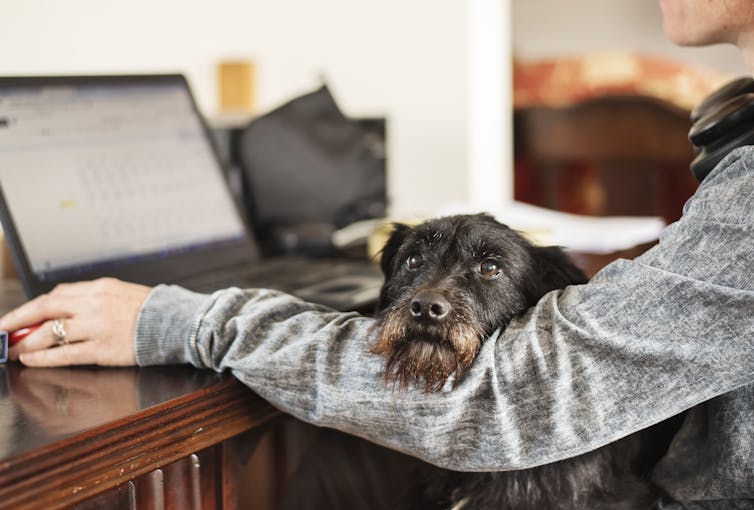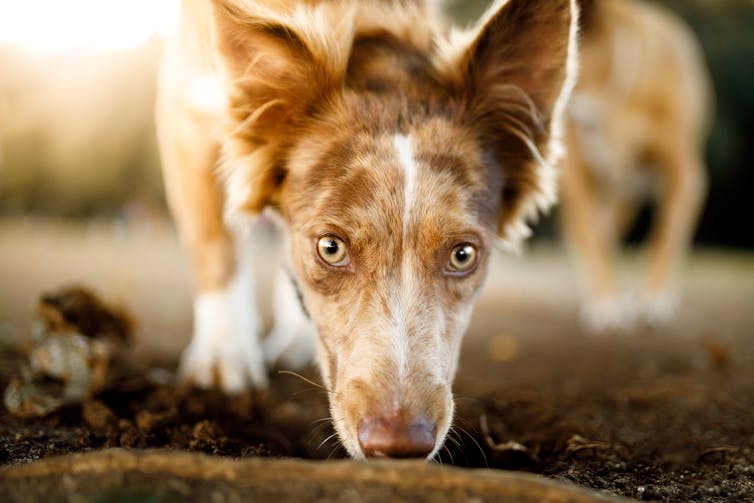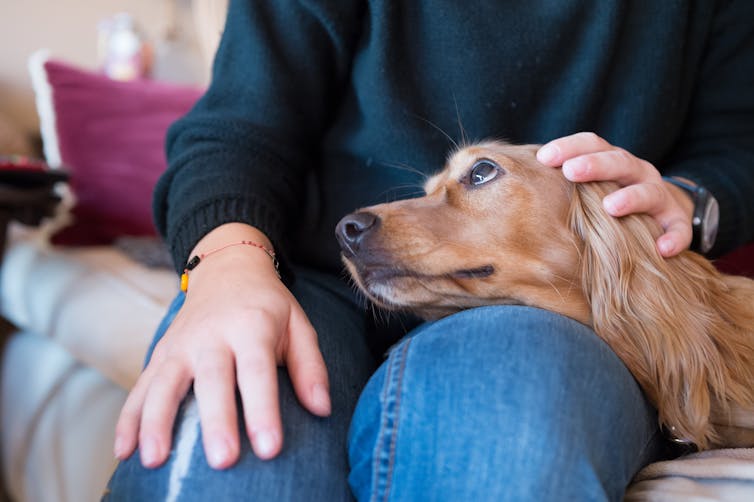Reasons to #Adopt a pandemic pooch – smarts!
Your Dog’s nose knows no bounds – and neither does its love for you

Ellen Furlong, Illinois Wesleyan University
I have discovered one positive amid the pandemic: I love working with two dogs at my feet.
As someone who studies dog cognition, I often wonder: What is Charlie learning when he stops to sniff the crisp fall air? What is Cleo thinking when she stares at me while I write? Are my dogs happy?
I’m not alone in finding myself suddenly spending more time with my pups and contemplating what’s on their minds. More people in the U.S. are working from home now than are working in the workplace, and many now share home offices with their canine companions. What’s more, many are finding their lives enriched with the addition of a new pet, as people started adopting dogs at massive rates during the pandemic.
This uptick in dog time means I have been fielding questions from new and experienced dog owners alike about their companions’ mentalities. Many questions center on the same themes I ponder: What is my dog thinking? Am I doing everything I can to ensure my pup is content?
Fortunately, research on dog cognition can help unravel what is on their minds and provide insight into what they need for psychologically fulfilling and happy lives.
Smelling superstars
Dogs are both familiar and yet fascinatingly alien. To appreciate their “otherness” all you need to do is consider their sensory world.

My dogs and I have very different experiences when we walk a trail. I marvel at the beautiful autumn day, but my dogs have their heads to the ground, seemingly ignoring the wonders around them.
However, they are appreciating something I can’t perceive: the scent of the fox who scampered through last night, the lingering odor of the dogs who’ve walked this way and the footsteps of my neighbor, who last wore her hiking shoes in woods my dogs have never visited.
You’ve probably heard about dogs who sniff out cancer, weapons or even coronavirus. These dogs are not special in their nose power: Your dog could do the same thing. In fact, the first dog to sniff out cancer sniffed a mole on his owner’s leg so frequently that she went to the dermatologist, where she was diagnosed with melanoma.
A dog’s sense of smell is estimated to be 10,000 to 100,000 times better than that of a human. This is due, in large part, to staggering differences in odor processing in humans and dogs.
While we have about 6 million olfactory receptors, dogs have a staggering 300 million. Their epithelium, or nasal tissue, is about 30 times larger than ours. And while people have between 12 million and 40 million olfactory neurons – specialized cells involved in transmitting odor information to the brain – dogs, depending on the breed, can have 220 million to 2 billion!
How can you even conceptualize this breathtaking difference in abilities? This disparity is like detecting one teaspoon of sugar in enough water to fill two Olympic sized swimming pools.
Now that your mind has been blown about your dog’s incredible sense of smell, you can use this information to make your dog happier by taking it on the occasional “sniffy walk” – letting it lead the way and take as much time to smell as it would like. Such walks can make dogs happier by allowing them to gain lots of information about the world around them.
The love is mutual
While there are parts of a dog’s mind that are alien, there are also parts that feel very familiar. Chances are, your dog occupies a special place in your heart. Recent research suggests your dog feels the same way about you. Your dog adores you.

Dogs attach to their owners in much the same way human infants attach to their parents. Like babies, dogs show distress when left with a stranger and rush to reunite upon their person’s return.
A recent study found that dogs that have been deprived of food and owners choose to greet their owners before eating. Further, their brain’s reward centers “light up” upon smelling their owners. And, when your eyes meet your dog’s, both your brains release oxytocin, also know as the “cuddle hormone.”
[Deep knowledge, daily. Sign up for The Conversation’s newsletter.]
All of this research shows that you can make your dog happier with just one ingredient: you. Make more eye contact to release that cuddle hormone. Touch it more – dogs like pats better than treats! Go ahead and “baby talk” to your dog – it draws the dog’s attention to you more and may strengthen your bond.
Understanding your dog’s mind can not only sate your curiosity about your companion, but can also help you ensure your pup lives a good, happy life. The more you know about your furry friends the more you can do to meet their needs.
And now I am off to gaze into Cleo’s bright blue eyes, give Charlie a belly rub, and then let them take me on a “sniffy” walk.
Ellen Furlong, Associate Professor of Psychology, Illinois Wesleyan University
This article is republished from The Conversation under a Creative Commons license. Read the original article.
1202 total views, 2 today